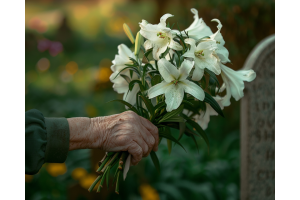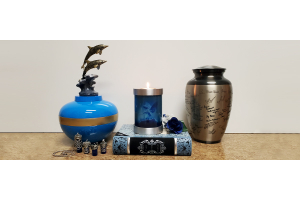
8 July 2024 • 10 min read
It's important to make sure that support during a time of grief can address unique needs faced by different demographics. Age, income level, marital status, disability, and location can all present different concerns.
Susan Fraser
Founder
Loss is a universal experience. Everyone has loss in their life, yet their journeys through grief will look different depending on individual circumstances and other factors. From focusing on their own end-of-life planning to choosing a cremation urn for their loved one, coping with loss can be handled in many ways.
The demographic category you belong to can not only affect how you personally experience grief on an emotional level but also the challenges you might face during that process and the strategies you'll use to move forward. Understanding what to expect and look for, as well as the next steps to help you decide on cremation options, find memorial products, and start the healing process, is extremely important. Here's how cultural and age differences can affect grief.
Seniors and the Elderly


Elderly people face a number of challenges, with the most common ones being physical limitations, cognitive decline, and social isolation. If you're socially isolated, loneliness can also become a big factor and compound any grief or loss you're feeling. To help reduce these challenges, you'll want to look for family support, or the help of friends or neighbors if you don't have family.
Also consider senior services and adapting your living arrangements to help you navigate your world more easily. That's especially valuable if you've lost a spouse or someone who was helping to care for you as you aged. You may need to consider moving, for example, so you can have the proper care you need during your later years.
Single or Widowed Parents
Single and newly widowed parents face the challenge of balancing grief with childcare, and they can experience financial strain and emotional exhaustion, as well. With good support networks such as family, friends, and community, though, they can get the help they need. Unfortunately, not all single parents have a lot of help, and many of them aren't sure where to get the support they need.
If you're a single or widowed parent coping with loss, look for grief support in single parent groups in your area. If there aren't any available, or you don't have a schedule that lets you attend meetings, you may want to look for online support options, as well. Also search for financial aid options that can help with memorial products, end-of-life planning, and more, so you have the resources you need during a difficult time.
Low-Income Families
If you're part of a low-income family you may have trouble with funeral expenses, including finding affordable custom cremation urns for ashes. Many low-income families also face a loss of income when they lose a loved one, and it can be challenging to access resources. Fortunately, there are some strategies to help. Consider affordable funeral alternatives and be sure to apply for government assistance.
You can also try crowdfunding options for increased support after a loss. A lot of people are reluctant to use this option because they don't want to feel like they're "begging" or asking for charity. Everyone needs some help sometimes, though, and asking for help with something like funeral expenses or a cremation urn isn't anything to be ashamed of. You deserve to be able to honor your loved one and their memory.
Children and Teenagers
Helping children understand death isn't always easy, and teenagers can also take the loss of a loved one particularly hard. For many children and teens this is the first close brush or experience with death they've had, and they can end up feeling scared, vulnerable, or even angry. The biggest challenge is often understanding death at different developmental stages, but there may also be family instability.
Age-appropriate grief counseling, maintaining routines, and offering open communication can help make coping with loss easier for young people. It's important to remember that children and teenagers don't typically process things the same way adults do, but that they are also individuals. Giving them the right information and then letting them work through it with your help can give them the space they need to work through their grief.


Immigrants and Non-Native Speakers
Navigating legal systems is a big challenge for immigrants and non-native speakers who may face language barriers, as well as misunderstandings based on their cultural differences in grieving. If you're not comfortable communicating in the native language where you live, there are cultural organizations, translation services, and legal aid offices that can help.
When you contact these organizations, they'll generally have interpreters who can talk you through end-of-life planning, cremation options, and other important decisions. You shouldn't agree to any legal contracts or other paperwork for the deceased person's estate until you reach out to a service that can help ensure that you understand what you're signing.
People with Disabilities
Disabled people can face serious life challenges if they lose a caregiver or other support person. That can lead to problems with everything from daily living help to accessibility issues in grief support services. If you're facing this situation or concerned about it for the future, there are disability support networks and adaptive grief counseling options that can help you focus on how to move forward.
Having the right grief support matters, but so does having proper physical and mental health care. If you have a disability and lose your caregiver, the goal is to make sure that person is properly memorialized and that you have the quality care you need for the future. Many caregivers have plans in place, but if that's not the case in your situation you should know that there are options to help you.
Individuals with Mental Health Issues
Mental health issues can be highly challenging on their own, depending on their type and severity. During the process of dealing with loss there can be an increased risk of complicated grief and an exacerbation of existing conditions. That can make it hard to do everything from choosing from custom cremations urns for ashes to handling your own end-of-life planning.
Fortunately, professional therapy, support groups specifically for grief and mental health, and self-care can go a long way toward helping you move through the grief process. Be kind to yourself during difficult times, as this reduces the chances of making a current mental health condition worse while you're trying to process too much at once.
Rural Residents
Rural residents are often geographically isolated while coping with loss, and they may have limited access to services, as well. If you're living far away from others there are online resources that may be able to help you feel connected, and where you can learn about cremation options and memorial products and get grief support.
Teletherapy can also make coping with loss easier, as can building community connections with people around you. Even if it's a small town or you have acreage, there are ways for rural people to connect and rely on one another. Don't be afraid to reach out to your neighbors or others nearby, as most rural residents know that helping one another and sticking together is important.
Universal Strategies
Even though coping with loss is different for everyone, and the support you need might look different from what someone else requires, there are some universal strategies that can help you feel connected as you heal. There are also some specifics you may have to address, or help others navigate, in the process of settling the person's estate. Here are a few of the areas that are universal to nearly everyone who loses someone close to them.


Seek Out the Support You Need
One of the most valuable strategies is to seek emotional support. If you have family who can help, that's usually the first place most people turn. However, not everyone has family, or they may be estranged or just not close. In that case, friends (both online and in person) and therapists can make things easier. There are many ways to connect with others, and it's important to find the ones that feel right for you.
Address the Practical Matters
You'll need to address the immediate practical matters that come with a loss, such as custom cremation urns for ashes, memorial products, legal documents, and more. If you have to settle the person's estate, for example, there are procedures to follow so you can do that, depending on where you live. These practical matters can be hard to face, but moving through them can put that part of the process behind you. That allows you to focus on processing your emotions and healing.
Settle Legal and Financial Issues
If you have legal or financial issues to settle, or that appear as a result of the loss of a loved one, don't put them off. It can be easy to push those kinds of things onto the back burner when you're struggling, sad, and feeling lost and alone. These kinds of concerns generally don't go away on their own, though, and they could become worse if you aren't proactive. Reach out for help from financial and legal professionals, and let them take care of these issues, so you can worry less.
Prioritize Health and Well-Being
Ultimately, you also need to prioritize your personal health and well-being. If something isn't a requirement and you don't want to do it, it's absolutely okay to say no. There are some things you may have to take care of, depending on the person you lost and your relationship to them. Just remember, there's nothing else you have to do other than fulfilling any specific obligations that are required of you. After that, you can say yes or no to everything else, so focus on how you really feel.
Understand the Process and Take Time
By understanding the grieving process and allowing yourself time to heal you'll be much more likely to move through the pain that comes with losing someone you love. It's not easy, and it will take time, but knowing how the process works and being kind to yourself can go a very long way toward starting to feel like yourself again. Everyone is different, and it's okay if your grief doesn't look like someone else's grief. Give yourself permission to feel the way you feel about the loss and the process of moving past it, and remember that there's no time limit or script you have to follow.
Summing Up the Differences and Challenges
With the number of diverse challenges grieving people face it's important to tailor support to their unique needs as much as possible. For example, if you're an elderly person in a rural area you'll need different grief support than a young child of immigrants living in a major city. The right support can make a significant difference in how someone gets through grief and whether they can handle deciding on cremation options, memorial products, and the best way to settle an estate.
Don't be afraid to seek help, and also don't be afraid to reach out to others and offer support if you know they're grieving a loss. Sometimes it really is the small things that people find so valuable in life, and that help them start to heal after they've lost someone they love. Local resources and grief counseling services or grief support groups are an important place to start when you need help, or when you want to encourage someone else to seek out the support they need and deserve.
There are many ways you can find support when coping with loss, including online grief counseling and looking for counselors in your local area for in-person sessions. There's no right or wrong answer about which kind of therapy is better, and you should choose the option that feels best for your needs or that's convenient for you, to get the process started.
If you're experiencing a loss and dealing with the grief that comes with it, or you're anticipating a sense of loss in the future, knowing what to expect and what could help is important. Then, you can get the help you need to handle the legal and financial issues that come with this loss, along with taking good care of your mental and physical health during the process.


Tristique odio senectus nam posuere ornare leo metus, ultricies. Blandit duis ultricies vulputate morbi feugiat cras placerat elit. Aliquam tellus lorem sed ac. Montes, sed mattis pellentesque suscipit accumsan. Cursus viverra aenean magna risus elementum faucibus molestie pellentesque. Arcu ultricies sed mauris vestibulum.
- Lectus id duis vitae porttitor enim gravida morbi.
- Eu turpis posuere semper feugiat volutpat elit, ultrices suspendisse. Auctor vel in vitae placerat.
- Suspendisse maecenas ac donec scelerisque diam sed est duis purus.
Morbi sed imperdiet in ipsum, adipiscing elit dui lectus. Tellus id scelerisque est ultricies ultricies. Duis est sit sed leo nisl, blandit elit sagittis. Quisque tristique consequat quam sed. Nisl at scelerisque amet nulla purus habitasse.
Key Takeaway:
Lorem ipsum dolor sit amet, consectetur adipiscing elit. Aenean aliquam laoreet porta. Donec tincidunt in mi ac ornare. Phasellus vitae felis lorem. Nunc semper at augue id molestie. Maecenas lobortis dolor diam. Fusce sit amet enim id nisi aliquam tristique nec a quam. Aliquam erat volutpat. Sed consequat aliquam nisi, non lobortis tellus ultricies ac. Duis a ex nec felis aliquet dapibus sit amet vel nulla.









